- Home
- Fredric Brown
Come and Go Mad Page 2
Come and Go Mad Read online
Page 2
She had smiled at him when she saw that his eyes were open. She said, “Good morning, Mr. Vine. Hope you’re feeling better. I’ll tell Dr. Holt that you’re back with us.”
She went away and came back with a man who was also strangely dressed, in roughly the same fashion as had been the stranger who had called him George.
The doctor looked at him and chuckled. “Got a patient, for once, who can’t talk back to me. Or even write notes.” Then his face sobered. “Are you in pain, though? Blink once if you’re not, twice if you are.”
The pain wasn’t really very bad this time, and he blinked once. The doctor nodded with satisfaction. “That cousin of yours,” he said, “has kept calling up. He’ll be glad to know you’re going to be back in shape to—well, to listen if not to talk. Guess it won’t hurt you to see him a while this evening.”
The nurse rearranged his bedclothing and then, mercifully, both she and the doctor had gone, leaving him alone to straighten out his chaotic thoughts.
Straighten them out? That had been three years ago, and he hadn’t been able to straighten them out yet:
The startling fact that they’d spoken English and that he’d understood that barbaric tongue perfectly, despite his slight previous knowledge of it. How could an accident have made him suddenly fluent in a language which he had known but slightly?
The startling fact that they’d called him by a different name. “George” had been the name used by the man who’d been beside his bed last night. “Mr. Vine,” the nurse had called him. George Vine, an English name, surely.
But there was one thing a thousand times more startling than either of those: It was what last night’s stranger (Could he be the “cousin” of whom the doctor had spoken?) had told him about the accident. ” You ran that coupe of yours head-on into a gravel truck.”
The amazing thing, the contradictory thing, was that he knew what a coupe was and what a truck was. Not that he had any recollection of having driven either, of the accident itself, or of anything beyond that moment when he’d been sitting in the tent after Lodi—but—but how could a picture of a coupe, something driven by a gasoline engine, arise to his mind when such a concept had never been in his mind before.
There was that mad mingling of two worlds—the one sharp and clear and definite. The world he’d lived his twenty-seven years of life in, in the world into which he’d been born twenty-seven years ago, on August 15th, 1769, in Corsica. The world in which he’d gone to sleep—it seemed like last night—in his tent at Lodi, as General of the Army in Italy, after his first important victory in the field.
And then there was this disturbing world into which he had awakened, this white world in which people spoke an English—now that he thought of it—which was different from the English he had heard spoken at Brienne, in Valence, at Toulon, and yet which he understood perfectly, which he knew instinctively that he could speak if his jaw were not in a cast. This world in which people called him George Vine, and in which, strangest of all, people used words that he did not know, could not conceivably know, and yet which brought pictures to his mind.
Coupe, truck. They were both forms of—the word came to his mind unbidden—automobiles. He concentrated on what an automobile was and how it worked, and the information was there. The cylinder block, the pistons driven by explosions of gasoline vapor, ignited by a spark of electricity from a generator.
Electricity. He opened his eyes and looked upward at the shaded light in the ceiling, and he knew, somehow, that it was an electric light, and in a general way he knew what electricity was.
The Italian Galvani—yes, he’d read of some experiments of Galvani, but they hadn’t encompassed anything practical such as a light like that. And staring at the shaded light, he visualized behind it water power running dynamos, miles of wire, motors running generators. He caught his breath at the concept that came to him out of his own mind, or part of his own mind.
The faint, fumbling experiments of Galvani with their weak currents and kicking frogs’ legs had scarcely fore-shadowed the unmysterious mystery of that light up in the ceiling; and that was the strangest thing yet; part of his mind found it mysterious and another part took it for granted and understood in a general sort of way how it all worked.
Let’s see, he thought, the electric light was invented by Thomas Alva Edison somewhere around—Ridiculous; he’d been going to say around 1900, and it was now only 1796!
And then the really horrible thing came to him and he tried—painfully, in vain—to sit up in bed. It had been 1900, his memory told him, and Edison had died in 1931. And a man named Napoleon Bonaparte had died a hundred and ten years before that, in 1821.
He’d nearly gone insane then.
And, sane or insane, only the fact that he could not speak had kept him out of a madhouse; it gave him time to think things out, time to realize that his only chance lay in pretending amnesia, in pretending that he remembered nothing of life prior to the accident. They don’t put you in a madhouse for amnesia. They tell you who you are, let you go back to what they tell you your former life was. They let you pick up the threads and weave them, while you try to remember.
Three years ago he’d done that. Now, tomorrow, he was going to a psychiatrist and say that he was—Napoleon!
III
The slant of the sun was greater. Overhead a big bird of a plane droned by and he looked up at it and began laughing, quietly to himself—not the laughter of madness. True laughter because it sprang from the conception of Napoleon Bonaparte riding in a plane like that and from the overwhelming incongruity of that idea.
It came to him then that he’d never ridden in a plane, that he remembered. Maybe George Vine had; at some time in the twenty-seven years of life George Vine had spent, he must have. But did that mean that he had ridden in one? That was a question that was part of the big question.
He got up and started to walk again. It was almost five o’clock; pretty soon Charlie Doerr would he leaving the paper and going home for dinner. Maybe he’d better phone Charlie and he sure he’d be home this evening.
He headed for the nearest bar and phoned; he got Charlie just in time. He said, “This is George. Going to be home this evening?”
“Sure, George. I was going to a poker game, but I called it off when I learned you’d be around.”
“When you learned—Oh, Candler talked to you?”
“Yeah. Say, I didn’t know you’d phone me or I’d have called Marge, but how about coming out for dinner? It’ll be all right with her; I’ll call her now if you can.”
He said, “Thanks, no, Charlie. Got a dinner date. And say, about that card game; you can go. I can get there about seven and we won’t have to talk all evening; an hour’ll be enough. You wouldn’t be leaving before eight anyway.”
Charlie said, “Don’t worry about it; I don’t much want to go anyway, and you haven’t been out for a while. So I’ll see you at seven, then.”
From the phone booth, he walked over to the bar and ordered a beer. He wondered why he’d turned down the invitation to dinner; probably because, subconsciously, he wanted another couple of hours by himself before he talked to anyone, even Charlie and Marge.
He sipped his beer slowly, because he wanted to make it last; he had to stay sober tonight, plenty sober. There was still time to change his mind; he’d left himself a loophole, however small. He could still go to Candler in the morning and say he’d decided not to do it.
Over the rim of his glass he stared at himself in the back-bar mirror. Small, sandy-haired, with freckles on his nose, stocky. The small and stocky part fitted all right; but the rest of it! Not the remotest resemblance.
He drank another beer slowly, and that made it half past five.
He wandered out again and walked, this time toward town. He walked past the Blade and looked up to the third floor and at the window he’d been working out of when Candler had sent for him. He wondered if he’d ever sit by that window again and look out across a
sunlit afternoon.
Maybe. Maybe not.
He thought about Clare. Did he want to see her tonight?
Well, no, to be honest about it, he didn’t. But if he disappeared for two weeks or so without having even said good-bye to her, then he’d have to write her off his books; she wouldn’t like that.
He’d better.
He stopped in at a drug store and called her home. He said, “This is George, Clare. Listen, I’m being sent out of town tomorrow on an assignment; don’t know how long I’ll be gone. One of those things that might be a few days or a few weeks. But could I see you late this evening, to say so-long?”
“Why sure, George. What time?”
“It might be after nine, but not much after. That be okay? I’m seeing Charlie first, on business; may not be able to get away before nine.”
“Of course, George. Any time.”
He stopped in at a hamburger stand, although he wasn’t hungry, and managed to eat a sandwich and a piece of pie. That made it a quarter after six and, if he walked, he’d get to Charlie’s at just about the right time. So he walked.
Charlie met him at the door. With finger on his lips, he jerked his head backward toward the kitchen where Marge was wiping dishes. He whispered, “I didn’t tell Marge, George. It’d worry her.”
He wanted to ask Charlie why it would, or should, worry Marge, but he didn’t. Maybe he was a little afraid of the answer. It would have to mean that Marge was worrying about him already, and that was a bad sign. He thought he’d been carrying everything off pretty well for three years now.
Anyway, he couldn’t ask because Charlie was leading him into the living room and the kitchen was within easy earshot, and Charlie was saying, “Glad you decided you’d like a game of chess, George. Marge is going out tonight; movie she wants to sec down at the neighborhood show. I was going to that card game out of self-defense, but I didn’t want to.”
He got the chessboard and men out of the closet and started to set up a game on the coffee table.
Marge came in with a try bearing tall cold glasses of beer and put it down beside the chessboard. She said, “Hi, George. Hear you’re going away a couple of weeks.”
He nodded. “But I don’t know where. Candler—the managing editor—asked me if I’d be free for an out of town assignment and I said sure, and he said he’d tell me about it tomorrow.”
Charlie was holding out clenched hands, a pawn in each, and he touched Charlie’s left hand and got white. He moved pawn to king’s fourth and, when Charlie did the same, advanced his queen’s pawn.
Marge was fussing with her hat in front of the mirror. She said, “If you’re not here when I get back, George, so long and good luck.”
He said, “Thanks, Marge. ’Bye.”
He made a few more moves before Marge came over, ready to go, kissed Charlie goodbye and then kissed him lightly on the forehead. She said, “Take care of yourself, George.”
For a moment his eyes met her pale blue ones and he thought, she is worrying about me. It scared him a little.
After the door had closed behind her, he said, “Let’s not finish the game, Charlie. Let’s get to the brass tacks, because I’ve got to see Clare about nine. Dunno how long I’ll gone, so I can’t very well not say good-bye to her.”
Charlie looked up at him. “You and Clare serious, George?”
“I don’t know.”
Charlie picked up his beer and took a sip. Suddenly his voice was brisk and businesslike. He said, ” All right, let’s sit on the brass tacks. We’ve got an appointment for eleven o’clock tomorrow morning with a guy named Irving, Dr. J. E. Irving, in the Appleton Block. He’s a psychiartrist; Dr. Randolph recommended him.
“I called him up this afternoon after Candler had talked to me; Candler had already phoned Randolph. My story was this: I gave my right name. I’ve got a cousin who’s been acting queer lately and whom I wanted him to talk to. I didn’t give the cousin’s name. I didn’t tell him in what way you’d been acting queer; I ducked the question and said I’d rather have him judge for himself without prejudice. I said I’d talked you into talking to a psychiatrist and that the only one I knew of was Randolph; that I’d called Randolph who said he didn’t do much private practice and recommended Irving. I told him I was your nearest living relative.
“That leaves the way open to Randolph for the second name on the certificate. If you can talk Irving into thinking you’re really insane and he wants to sign you up, I can insist on having Randolph, whom I wanted in the first place. And this time, of course, Randolph will agree.”
“You didn’t say a thing about what kind of insanity you suspected me of having?”
Charlie shook his head. He said, “So, anyway, neither of us goes to work at the Blade tomorrow. I’ll leave home the usual time so Marge won’t know anything, but I’ll meet you downtown—say, in the lobby of the Christina—at a quarter of eleven. And if you can convince Irving that you’re committable—if that’s the word—we’ll get Randolph right away and get the whole thing settled tomorrow.”
“And if I change my mind?”
“Then I’ll call the appointment off. That’s all. Look, isn’t that all there is to talk over? Let’s play this game of chess out; it’s only twenty after seven.”
He shook his head. “I’d rather talk. Charlie. One thing you forgot to cover, anyway. After tomorrow. How often you coming to see me to pick up bulletins for Candler?”
“Oh, sure, I forgot that. As often as visiting hours will permit—three times a week. Monday, Wednesday, Friday afternoons. Tomorrow’s Friday, so if you get in, the first time I’ll he able to see you is Monday.”
“Okay. Say, Charlie, did Candler even hint to you at what the story is that I’m supposed to get in there?”
Charlie Doerr shook his head slowly. “Not a word. What is it? Or is it too secret for you to talk about?”
He stared at Charlie, wondering. And suddenly he felt that he couldn’t tell the truth; that he didn’t know either. It would make him look too silly. It hadn’t sounded so foolish when Candler had given the reason—a reason, anyway—for not telling him, but it would sound foolish now.
He said, “If he didn’t tell you, I guess I’d better not either, Charlie.” And since that didn’t sound too convincing, he added, “I promised Candler I wouldn’t.”
Both glasses of beer were empty by then, and Charlie took them into the kitchen for refilling.
He followed Charlie, somehow preferring the informality of the kitchen. He sat a-straddle on a kitchen chair, leaning his elbows on the back of it, and Charlie leaned against the refrigerator.
Candler said. “Prosit!” and they drank, and then Charlie asked, “Have you got your story ready for Doc Irving?”
He nodded. “Did Candler tell you what I’m to tell him?”
“You mean, that you’re Napoleon?” Charlie chuckled. Did that chuckle quite ring true? He looked at Charlie, and he knew that what he was thinking was completely incredible. Charlie was square and honest as they came. Charlie and Marge were his best friends; they’d been his best friends for three years that he knew of. Longer than that, a hell of a lot longer, according to Charlie. But beyond those three years—that was something else again.
He cleared his throat because the words were going to stick a little. But he had to ask, he had to be sure. “Charlie, I’m going to ask you a hell of a question. Is this business on the up and up?”
“Huh?”
“It’s a hell of a thing to ask. But—look, you and Candler don’t think I’m crazy, do you? You didn’t work this out between you to get me put away—or anyway examined—painlessly, without my knowing it was happening, till too late, did you?”
Charlie was staring at him. He said, “Jeez, George, you don’t think I’d do a thing like that, do you?”
“No, I don’t. But you could think it was for my own good, and you might on that basis. Look, Charlie, if it is that, if you think that, let me point out that this i
sn’t fair. I’m going up against a psychiatrist tomorrow to lie to him, to try to convince him that I have delusions. Not to be honest with him. And that would be unfair as hell, to me. You see that, don’t you, Charlie?”
Charlie’s face got a little white. He said slowly, “Before God, George, it’s nothing like that. All I know about this is what Candler and you have told me.”
“You think I’m sane, fully sane?”
Charlie licked his lips. He said, “You want it straight?”
“Yes.”
“I never doubted it, until this moment. Unless—well, amnesia is a form of mental aberration, I suppose, and you’ve never got over that, but that isn’t what you mean, is it?”
“No.”
“Then, until right now—George, that sounds like a persecution complex, if you really meant what you asked me. A conspiracy to get you to—Surely you can see how ridiculous it is. What possible reason would either Candler or I have to get you to lie yourself into being committed?”
He said, “I’m sorry, Charlie. It was just a screwy momentary notion. No, I don’t think that, of course.” He glanced at his wrist watch. “Let’s finish that chess game, huh?”
“Fine. Wait till I give us a refill to take along.”
He played carelessly and managed to lose within fifteen minutes. He turned down Charlie’s offer of a chance for revenge and leaned back in his chair.
He said, “Charlie, ever hear of chessmen coming in red and black?”
“N-no. Either black and white, or red and white, any I’ve ever seen. Why?”
“Well—” He grinned. “I suppose I oughtn’t to tell you this after just making you wonder whether I’m really sane after all, but I’ve been having recurrent dreams recently. No crazier than ordinary dreams except that I’ve been dreaming the same things over and over. One of them is something about a game between the red and the black; I don’t even know whether it’s chess. You know how it is when you dream; things seem to make sense whether they do or not. In the dream, I don’t wonder whether the red-and-black business is chess or not; I know, I guess, or seem to know. But the knowledge doesn’t carry over. You know what I mean?”

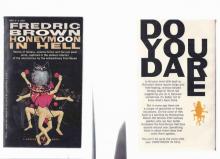 Hall of Mirrors
Hall of Mirrors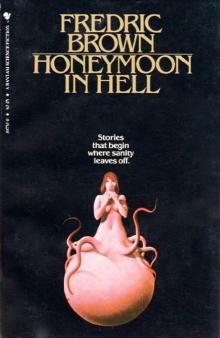 Honeymoon in Hell
Honeymoon in Hell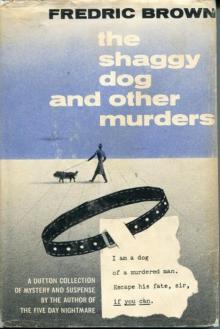 The Shaggy Dog and Other Murders
The Shaggy Dog and Other Murders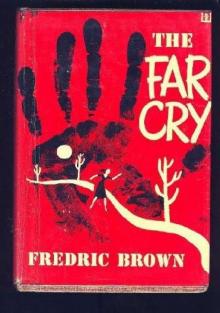 The Far Cry
The Far Cry Arena
Arena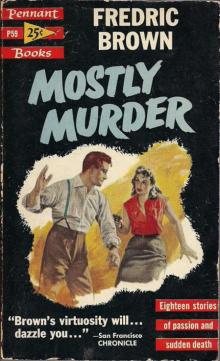 Mostly Murder
Mostly Murder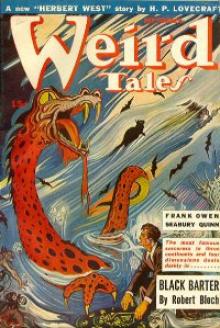 The Geezenstacks
The Geezenstacks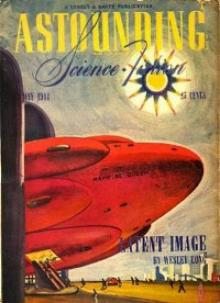 The Yehudi Principle
The Yehudi Principle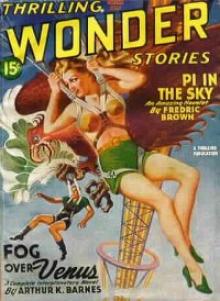 Pi in the Sky
Pi in the Sky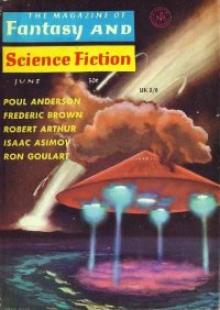 Eine Kleine Nachtmusik
Eine Kleine Nachtmusik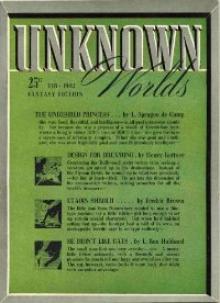 Etaoin Shrdlu
Etaoin Shrdlu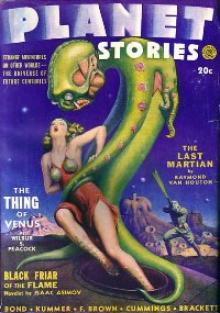 The Star Mouse
The Star Mouse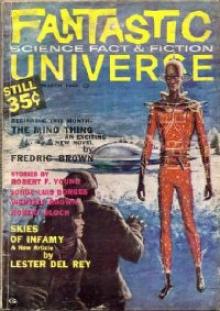 The Mind Thing
The Mind Thing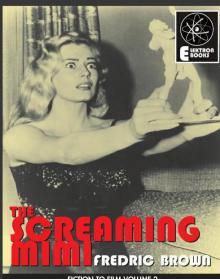 The Screaming Mimi
The Screaming Mimi The Fabulous Clipjoint
The Fabulous Clipjoint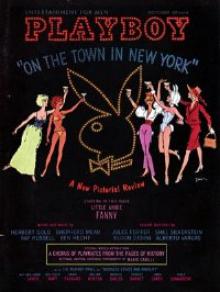 Puppet Show
Puppet Show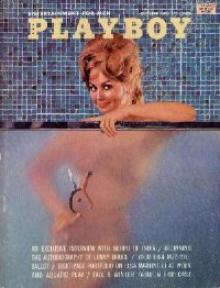 It Didn't Happen
It Didn't Happen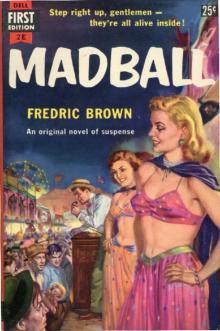 Madball
Madball Happy Ending
Happy Ending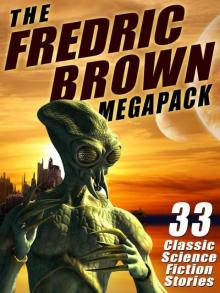 The Fredric Brown Megapack: 33 Classic Science Fiction Stories
The Fredric Brown Megapack: 33 Classic Science Fiction Stories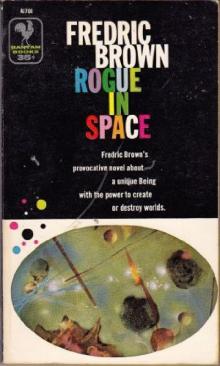 Rogue in Space
Rogue in Space Night of the Jabberwock
Night of the Jabberwock The Dead Ringer
The Dead Ringer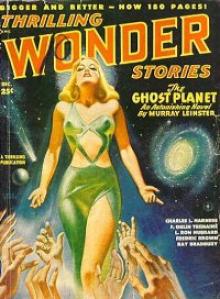 Knock
Knock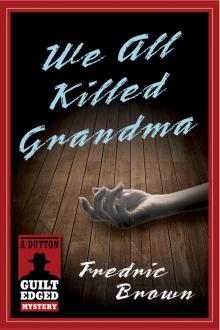 We All Killed Grandma
We All Killed Grandma Space On My Hands
Space On My Hands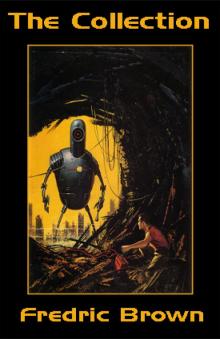 The Collection
The Collection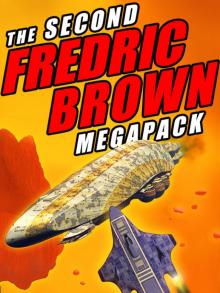 The Second Fredric Brown Megapack: 27 Classic Science Fiction Stories
The Second Fredric Brown Megapack: 27 Classic Science Fiction Stories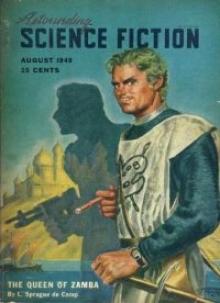 Letter to a Phoenix
Letter to a Phoenix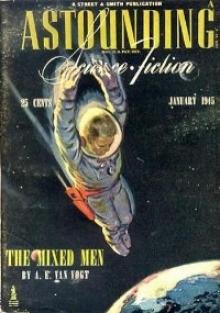 The Waveries
The Waveries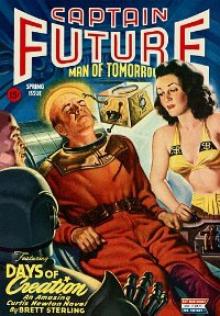 Nothing Sirius
Nothing Sirius The Deep End
The Deep End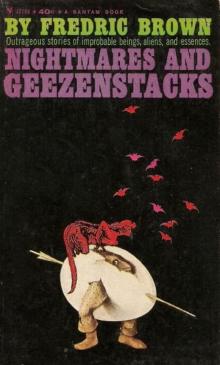 Nightmares & Geezenstacks
Nightmares & Geezenstacks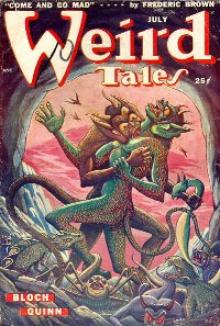 Come and Go Mad
Come and Go Mad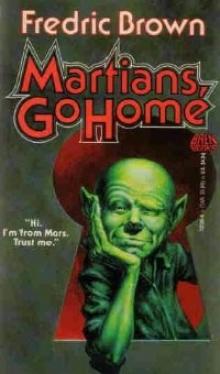 Martians, Go Home
Martians, Go Home